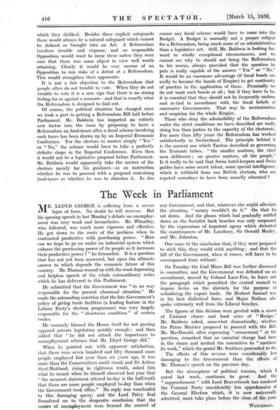The Week in Parliament
MR. LLOYD GEORGE is suffering from a severe -lapse of form. No doubt he will recover. But his opening speech in last Monday's debate on unemploy- ment was very weak and inconclusive. Mr. Wheatley, who followed, was much more vigorous and effective. He got. down to- the roots of the problem . when he contrasted • productive with purchasing power. " How can we hope to go on under an .industrial system which reduces the purchasing power of its people as it increases their productive power ? " he demanded. It is a question that- has not yet been answered, but upon the ultimate answer to which depends the economic future of this country.. • Mr. Thomas wound up with the most depressing and- helpless speech of the whole extraordinary series which he has delivered in this Parliament.
He submitted that the Government was " in no way responsible for the present abnormal situation." He made the astounding assertion that the late Government's policy of giving trade facilities (a leading feature in the Labour Party's election programme) was very largely responsible for the " disastrous condition " of certain trades.
He morosely blamed the House itself for not passing opposed private legislation quickly enough ; and then added that " he did not attach the importance to unemployment schemes that Mr. Lloyd George did."
When he pointed out, with apparent satisfaction, that there were seven hundred and fifty thousand more people " employed last year than six years ago, it was more than the Conservatives could stand, and Sir Arthur SteeI-Maitland, rising in righteous wrath, asked him what he meant when he himself observed last year that " the meanest statement uttered'to=day is the half-truth that there are more people employed to-day than when the GoVernment took Office." No reply was vouchsafed to this &Merging query, and the Lord- Privy Seal floundered on to the desperate' conclusion that the causes of unemployment were beyond the control of any Government, and that, whatever else might alleviate the situation, " money wouldn't do it." On that he sat down. And the gloom which had gradually settled down on the Socialist back benches was only surpassed by the expressions of impotent agony which distorted the countenances of Mr. 'Lansbury; Sir Oswald Mosley, and Mr.• Johnston.
One came td' the conclusion that, if they were' prepared to stick this, they would stick anything ; and that the fall of the GoVernment, when it comes, will have to be encompassed froth without.
On Tuesday the Coal Mines Bill was further discussed in committee, and the Government was defeated on an amendment, moved by Colonel Lane-Fox, to leave out the paragraph which permitted the central council to impose levies on the districts for the purpose of subsidizing the export trade. Sir Herbert Sfiniuel was in his best dialectical form, and Major Nathan also spoke extremely well from the Liberal benches.
The figures of this division were greeted with a storm of Unionist cheers and loud cries of " Resign." Mr. Baldwin asked, somewhat dramatically, whether the Prime Minister proposed to proceed with the Bill. Mr. MacDonald, after expressing " amazement " at the question, remarked that no essential change had been in the clause and invited the committee to " continue its work," which the genial Mr. Smithers proceeded to do.
The effects of this reverse were considerably less damaging to the Government than the effects of Mr. Thomas's speech on the previous day.
But the atmosphere of political tension, which 1 noted last week, - continues to grow. And - the " rapprochement " with Lord Beaverbrook has rendered the Unionist Party considerably less apprehensive of the General Election which, it is now- universally admitted, must take place before the close.,of, the year
WATCHMAN:




















































 Previous page
Previous page